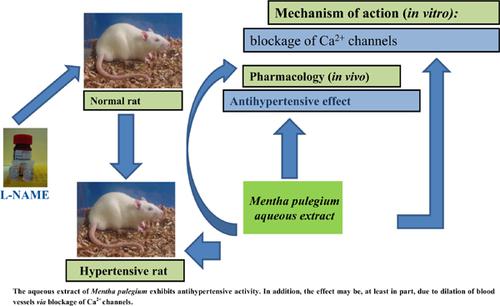Endocrine, Metabolic & Immune Disorders - Drug Targets ( IF 1.9 ) Pub Date : 2021-06-30 , DOI: 10.2174/1871530320666200909093908 Mohammed Ajebli 1 , Mohamed Eddouks 1

|
Aims The aim of the study was to investigate the effect of aqueous aerial part extract of Mentha pulegium L. (Pennyrile) (MPAE) on arterial pressure parameters in rats.
Background: Mentha pulegium is a medicinal plant used to treat hypertension in the Moroccon population.
Methods: In the current study, MPAE was prepared and its antihypertensive activity was pharmacologically investigated. L-NAME-hypertensive and normotensive rats received MPAE (180 and 300 mg/kg) orally for six hours for acute experiment and during seven days for the sub-chronic treatment. Thereafter, systolic, diastolic, mean arterial blood pressure and heart rate were evaluated. In the in vitro experiment, isolated denuded and intact thoracic aortic rings were suspended in a tissue bath system and the tension changes were recorded.
Results: A fall in blood pressure was observed in L-NAME-induced hypertensive treated with MPAE. The extract also produced a dose-dependent relaxation of aorta pre-contracted with NE and KCl. The study showed that the vasorelaxant ability of MPAE seems to be exerted through the blockage of extracellular Ca2+ entry.
Conclusion: The results demonstrate that the extract of pennyrile exhibits antihypertensive activity. In addition, the effect may be, at least in part, due to the dilation of blood vessels via blockage of Ca2+ channels.
中文翻译:

Mentha pulegium L. 在大鼠中的血管舒张和抗高血压作用:体外和体内方法
目的 本研究的目的是研究薄荷地上部分提取物 (Pennyrile) (MPAE) 对大鼠动脉压参数的影响。
背景:薄荷是一种用于治疗摩洛哥人群高血压的药用植物。
方法:在目前的研究中,制备了 MPAE 并对其抗高血压活性进行了药理学研究。L-NAME-高血压和正常血压大鼠口服 MPAE(180 和 300 mg/kg)进行急性实验 6 小时,亚慢性治疗 7 天。此后,评估收缩压、舒张压、平均动脉血压和心率。在体外实验中,将分离的裸露和完整的胸主动脉环悬浮在组织浴系统中,并记录张力变化。
结果:在用 MPAE 治疗的 L-NAME 诱导的高血压中观察到血压下降。该提取物还产生了与 NE 和 KCl 预收缩的主动脉的剂量依赖性松弛。研究表明,MPAE 的血管舒张能力似乎是通过阻断细胞外 Ca 2+进入而发挥的。
结论:结果表明丁香提取物具有抗高血压活性。此外,该效应可能至少部分是由于通过阻塞 Ca 2+通道导致血管扩张。



























 京公网安备 11010802027423号
京公网安备 11010802027423号